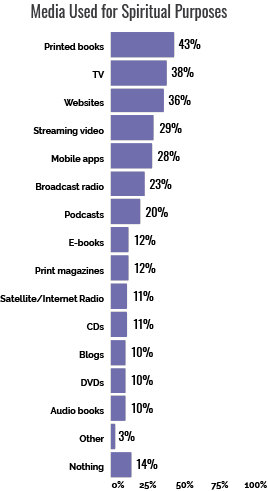Evangelicals use wide variety of media to access Christian content, study finds
Evangelical Protestants access Christian content through a variety of media, according to a study called Media Matters: Evangelicals and Media. Infinity Concepts and Grey Matter Research released survey results this week.
 Evangelicals were asked to distinguish between content that is specifically Christian — not just “clean” or “family-friendly” — and content that is not specifically Christian. Almost every study participant reported consuming both specifically Christian content and that which is not specifically Christian. The proportion of content that is specifically Christian differs substantially among media types.
Evangelicals were asked to distinguish between content that is specifically Christian — not just “clean” or “family-friendly” — and content that is not specifically Christian. Almost every study participant reported consuming both specifically Christian content and that which is not specifically Christian. The proportion of content that is specifically Christian differs substantially among media types.
Three media types — broadcast radio, podcasts and books — have evangelicals relying on specifically Christian content for the majority of what they consume. All the rest (television, streaming video, magazines and websites) have the typical evangelical reporting the majority of the content they consume is not specifically Christian. And they’re relying on radio, less and less.
The study found consumption of specifically Christian media content tends to be higher among three types of evangelicals:
- Those with greater overall spiritual engagement
- Those who are charismatic or Pentecostal
- Those in the lowest income group
“As we would expect, younger evangelicals are especially likely to use newer forms of media, such as satellite radio, Internet radio, apps and podcasts,” said Mark Dreistadt, founder and president of Infinity Concepts. “But substantial proportions of younger evangelicals also use more traditional media, such as television and printed books, as part of their faith practices. Younger evangelicals use a wider variety of different media than their older counterparts.”
This effect is fairly common, said Ron Sellers, president of Grey Matter Research.
“We’ve seen this in many other areas — something new is introduced, and it’s predicted to be the quick death of something traditional,” he said. “For instance, we saw it with e-readers, which were quickly predicted to kill off printed books. Instead, what often happens is consumers adopt the new along with the old rather than instead of the old, depending on specific needs.”
Secular studies have also looked at the media habits of Evangelicals.
–Alan Goforth | Metro Voice








